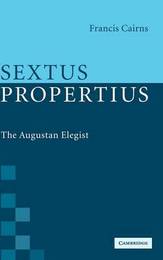
|
Sextus Propertius: The Augustan Elegist
Hardback
Main Details
| Title |
Sextus Propertius: The Augustan Elegist
|
| Authors and Contributors |
By (author) Francis Cairns
|
| Physical Properties |
| Format:Hardback | | Pages:510 | | Dimensions(mm): Height 229,Width 152 |
|
| Category/Genre | Literary studies - classical, early and medieval |
|---|
| ISBN/Barcode |
9780521864572
|
| Classifications | Dewey:874.01 |
|---|
| Audience | | Professional & Vocational | |
|---|
|
Publishing Details |
| Publisher |
Cambridge University Press
|
| Imprint |
Cambridge University Press
|
| Publication Date |
31 August 2006 |
| Publication Country |
United Kingdom
|
Description
In 30-15 BC Sextus Propertius composed at Rome four books of elegies which range from erotic to learned to political and exhibit an unparalleled richness of themes, concepts and language. This book investigates their sources and motives, examining Propertius' family background in Umbrian Asisium and tracing his career as he sought through poetry to restore his family's fortunes after the Civil Wars. Propertius' progress within the Roman poetic establishment depended on his patrons - Tullus, 'Gallus', Maecenas and Augustus. Initially his poetry was influenced radically by his elegiac predecessor C. Cornelius Gallus, arguably also the 'Gallus' who jointly patronised Propertius' first book. New heuristic techniques help to recover the impact on Propertius of Cornelius Gallus' (mainly lost) elegies. Propertius' subsequent move into Maecenas', and then Augustus', patronage had an equally powerful, ideological, impact; in his latter books he became (alongside Virgil and Horace) a major and committed Augustan voice.
Author Biography
Francis Cairns is Professor of Classical Languages at the Florida State University. He is the author of Generic Composition in Greek and Roman Poetry (1972), Tibullus: A Hellenistic Poet at Rome (1979) and Virgil's Augustan Epic (1989), as well as numerous articles on Greek and Latin poetry.
Reviews'... there is an enormous amount of useful material here ... he (Cairns) offers useful stimuli to thought and argument.' Times Literary Supplement
|